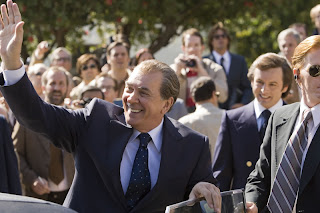The Unimportance of Being Earnest: Frost/Nixon
 Five Oscar nominations, including best film, best director (Ron Howard), and best actor (Frank Langella)? I had forgotten how Frost/Nixon had been adapted from a well-received play by Peter Morgan, but after watching Slumdog Millionaire and The Curious Case of Benjamin Button, Frost/Nixon struck me as decidedly underwhelming.
Five Oscar nominations, including best film, best director (Ron Howard), and best actor (Frank Langella)? I had forgotten how Frost/Nixon had been adapted from a well-received play by Peter Morgan, but after watching Slumdog Millionaire and The Curious Case of Benjamin Button, Frost/Nixon struck me as decidedly underwhelming.Though I enjoyed Ron Howard's Call to Action video in which he dressed up as Opie in support of the Obama campaign, Frost/Nixon unfortunately feels like was directed by Opie in its blandness. As the film sedately cuts back and forth from the retired Nixon to David Frost as they prepare for their big 1977 television showdown, the whole Rocky-like fight hype seems overblown and, finally, anticlimactic. I imagine that the filmmakers meant for me to make all kinds of connections between Nixon and George W. Bush--both with misguided wars to account for, both with a tendency to think of the presidency as above the law, but aside from looking like this year's Good Night and Good Luck (2005), another Oscar-nominated and self-congratulatory Hollywood film about the media's treatment of corrupt politicians, why does Frost/Nixon deserve all of the Oscar nods? Because it is earnest? Because it wrestles with the issues? Because Americans still need closure concerning Watergate? Because Frost almost lost his TV show in Australia?
Ultimately, I prefer the treatment of Nixon in Gonzo: The Life and Work of Dr. Hunter S. Thompson, because there at least tricky Dick seems worthy of all the scorn poured onto him. In Frost/Nixon, Nixon is treated with such ginger respect, with Frank Langella hunching his shoulders and speaking through his not-quite-large-enough nose, I developed a sneaking sympathy for the [spoiler alert] politician's last-ditch machinations. When he finally semi-gives in to Frost's appeal to acknowledge his guilt, he just seems tired of the whole pseudo-drama. In the end, Frost/Nixon just made me want to watch the last segment of the original interview, the one devoted to Watergate. The film itself spoke to me more about the value judgments of today's Academy of Motion Picture Arts and Sciences than of any political wrongdoings back in the 1970s.


Comments